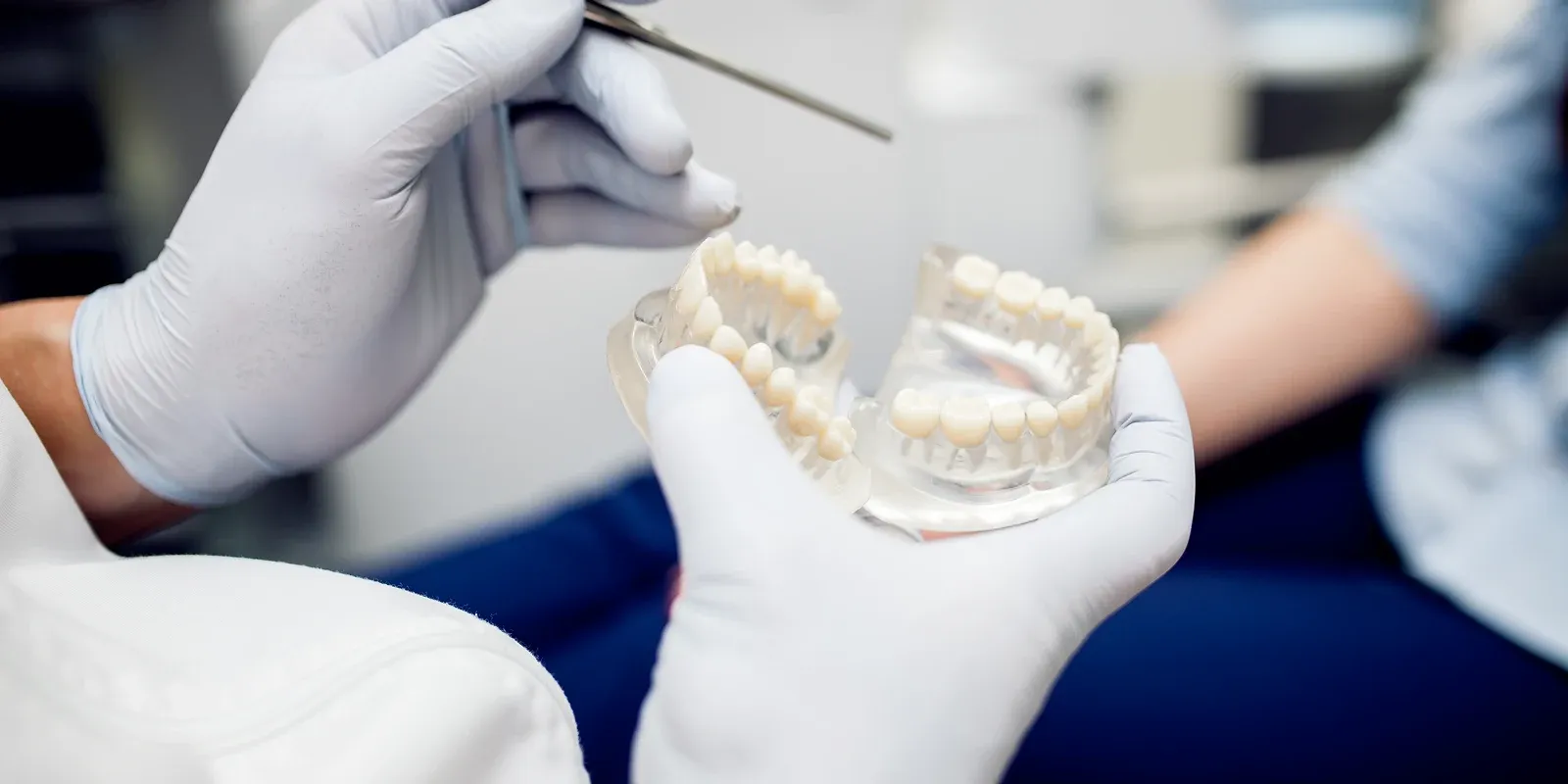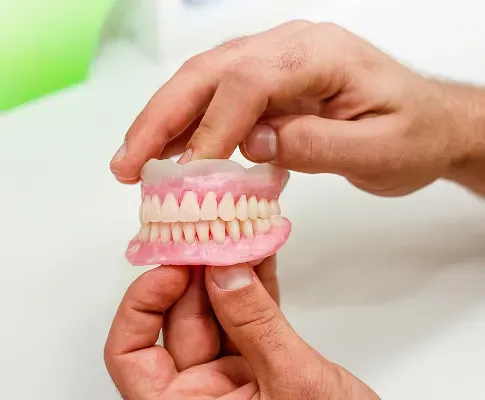
Dental Bridges vs. Other Tooth Replacement Options: What’s Best for You?

Dr. Uvika Singh
20 June 2025
Losing a tooth can be tough, affecting not just your smile but also your everyday life. Luckily, there are several ways to replace missing teeth, each with its own pros and cons. Dental bridges are a popular option among these choices.
Here we will have dental bridge comparison to other options and help you figure out which one is best tooth replacement solution for you.

What Are Dental Bridges?
A dental bridge is a device used to fill the gap left by one or more missing teeth. It consists of one or more artificial teeth, called pontics, that are held in place by crowns on the teeth next to the gap. This makes it a quick way to restore both function and appearance, which is why many people choose this option.
Cost of Dental Bridges
The price of dental bridges can vary widely based on where you live, how complex the case is, and the materials used. Dental insurance may cover some of the cost. So, it is a good idea to check your policy to see what is covered.
Dental Bridges Benefits
Here are the benefits.
Quick and Efficient
Getting dental bridges usually takes only a few visits to the dentist. This makes it a time-saving choice compared to other methods that might take longer.
Minimally Invasive
Unlike dental implants, which require surgery, getting dental bridges involves reshaping nearby teeth and placing crowns. This less invasive method can be a good option for those who are nervous about surgery.
Cost-Effective
Dental bridges often cost less upfront than implants. This is making them a popular choice for people looking for effective and budget-friendly solutions.
Improved Appearance
Dental bridges can look very similar to natural teeth. These help in enhancing your smile and boosting your confidence. They are made to match the color and shape of your existing teeth.
Prevents Teeth from Shifting
By filling the gaps left by missing teeth, bridges help keep your other teeth aligned. It ultimately helps in preventing them from moving and causing more dental problems.
Dental Bridges Downsides
Longevity
While dental bridges can last several years, they typically need to be replaced every 5 to 15 years. This depends on how well you take care of your teeth. This can lead to extra costs over time.
Impact on Nearby Teeth
The procedure requires altering the neighboring teeth to fit the crowns. It can affect their structure. This is an important consideration for those who want to keep their natural teeth intact.
Potential for Gum Issues
The area around the bridge can be at risk for gum disease if not cared for properly. Regular dental visits and good oral hygiene are essential to avoid complications.
Other Tooth Replacement Options
So, here are other options.
Dental Implants
Let’s talk about implants vs. bridges. Dental implants are titanium posts that are surgically placed into your jawbone to act as artificial tooth roots. Once the implant fuses with the bone, a crown is attached on top. This permanent tooth replacement will be giving you a natural-looking and functional replacement tooth.
Pros:
Permanent Solution
When it comes to dental bridges vs. implants, they can last a lifetime with proper care. This is making them a good long-term investment. This durability can save you money over time.
Bone Health
Implants help stimulate the jawbone. It prevents bone loss that can happen with missing teeth. This is important for keeping your face's shape and avoiding more dental problems.
Natural Feel and Function
Many people find that implants feel and work more like real teeth compared to other options. It ultimately can improve comfort and confidence.
Cons:
Surgical Procedure
Getting an implant involves surgery, which might scare some patients. The idea of surgery can be intimidating, especially for those who are nervous about dental work.
Longer Treatment Time
The whole process can take several months because the implant needs time to heal and bond with the bone. This can be a downside for those looking for a quicker solution.
Higher Costs
Dental implants can be more expensive than bridges This higher upfront cost can be a barrier for some people.
Partial Dentures
Partial dentures are removable devices designed to replace one or more missing teeth while still keeping your remaining natural teeth. They are made with a plastic or metal frame that holds artificial teeth.
Pros:
Versatile
Partial dentures can replace multiple missing teeth in different parts of your mouth. This is making them a flexible option for various dental settings.
Cost-Effective
Generally, partial dentures are cheaper than both bridges and implants. Their affordability can make them appealing for many patients.
Cons:
Less Stability
Partial dentures can shift in your mouth and may need adjustments over time. It can be uncomfortable and inconvenient.
Maintenance
They need to be taken out and cleaned every day, which can be a hassle for some people. Proper care is necessary to keep them looking good and working well.
Aesthetic Limitations
While they can look natural, they may not be as visually appealing as implants or bridges. Some patients might feel self-conscious about wearing them.
“An aching tooth is better out than in. To lose a rotting member is a gain.’
– Richard Baxter”
Full Dentures
Full dentures are a complete set of artificial teeth used to replace all the teeth in either your upper or lower jaw. They are removable and can be made from a mix of acrylic, resin, and metal.
Pros:
Comprehensive Solution
Full dentures restore both the look and function of a complete set of teeth. It can greatly improve your quality of life. They can help with speaking and chewing.
Lower Initial Cost
They are typically more affordable than implants or bridges. Their makes them accessible to many people.
Cons:
Comfort Issues
Some patients may find dentures uncomfortable, especially when they first start wearing them. It can take time to get used to having them in your mouth.

Need Any Help?
Contact UsMaintenance Requirements
Full dentures need to be taken out for cleaning and must be handled carefully to avoid damage. This can be inconvenient for some individuals.
Bone Loss
Dentures do not prevent bone loss, which can change the shape of your face over time. This is an important consideration for long-term oral health.
How to Choose the Best Tooth Replacement Option for You?
Electing the right tooth replacement solution requires careful consideration. Here are some factors to keep in mind.
- Budget: Consider your budget and what you can afford. Check tooth replacement costs to make the right decision as per your budget.
- Health Status: Your overall health, including oral health and bone density, will play a significant role in determining which option is suitable. For example, insufficient bone density may disqualify you from receiving implants.
- Longevity: If you’re looking for a permanent tooth replacement, implants might be the best choice. However, if you’re seeking a quicker solution, bridges or dentures may be more appropriate.
- Lifestyle and Preferences: Think about how much maintenance you’re willing to undertake. Some options require more frequent cleaning and care than others.
- Consult Your Dentist: Ultimately, your dentist is the best resource for advice tailored to your situation. They can assess your oral health and guide you toward the most suitable option.
Conclusion
Overall, this is all for dental bridges and other tooth replacement options. You can make a decision of choosing the best tooth solutions based on your needs, lifestyle preferences, and your oral health condition.
Contact your dentist today in Oakland, Dr. Uvika Singh, at Advance Dental Concepts Oakland, to learn more about Dental Bridges vs. Other Tooth Replacement Options and what’s Best for you?
Resource:
Eating with Dental Bridges: What to Expect and How to Adjust?
Share This:
Disclaimer
*This media/content or any other on this website does not prescribe, recommend, or prevent any treatment or procedure. Therefore, we highly recommend that you get the advice of a qualified dentist or other medical practitioners regarding your specific dental condition. *
